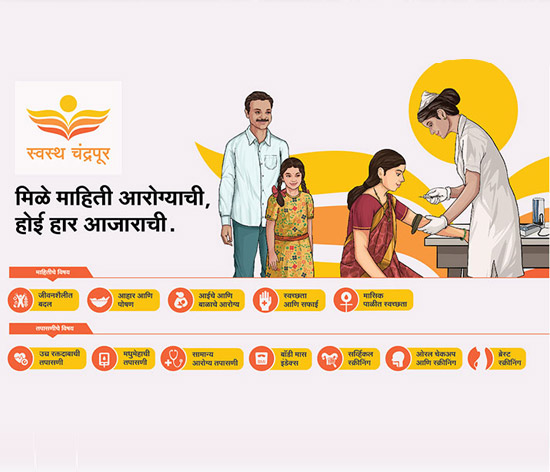
Vikas Wadke*, a resident of Chandrapur in Maharashtra, had been chewing gutka (tobacco) for years. So perhaps, what followed does not come as a surprise. On 18 January 2021, 36-year-old Vikas woke up feeling an unbearable pain in his mouth. Even the act of opening his mouth hurt.
What happened next is where the storyline takes an unexpected tack. To understand what was wrong, Vikas did not visit the local doctor, but instead walked into a health and wellness kiosk. Two months earlier, in November 2020, Tata Trusts had set up the Swasth Chandrapur opportunistic screening and awareness kiosk at the Government Medical College. The kiosk is an initiative of the Chandrapur Cancer Care Foundation (CCCF), a public-private partnership of the Maharashtra state government, Directorate of Medical Education and Research (DMER), District Mineral Foundation (DMF) and Tata Trusts.
The opportunistic health kiosk is a solution that can be a game changer for India’s healthcare system, offering free screening for Non-Communicable Diseases (NCDs) such as diabetes, hypertension, and oral, breast and cervical cancers.
The focus on NCDs is because of the worrying health data. Maharashtra’s incidence of NCDs is high – forming 63% of the overall disease burden. The risk of NCDs is higher for those who consume tobacco. Over a third (35%) of the men in Maharashtra consume tobacco in some form and, like Vikas, start at an early age; when it comes to women and tobacco, the rate is 17%. Consequently, the state also has a high incidence rate of cancer at 80 people per 100,000 population. However, most of the common cancers – oral, breast and cervix – can be easily detected with regular screenings.
Since Vikas was aware of the Swasth Chandrapur kiosk, he visited the kiosk and got himself screened without any delay. A clinical examination showed that he had restricted tongue movement and difficulty in swallowing. He was advised to visit the nearest district hospital without delay for a biopsy. The biopsy was performed on 20 January 2021 and the reports confirmed that Vikas was suffering from oral cancer.
Immediately after the diagnosis, Vikas was counselled at the Swasth Chandrapur kiosk where the medical team helped him cope with fear and anxiety, and gave him the confidence to undergo treatment. He was also given information about the relevant government health scheme under which he could avail cashless treatment.
On 4 February 2021, Vikas was referred to the National Cancer Institute (NCI), Nagpur for further diagnostic procedures and treatment. He was advised six chemotherapy cycles and he successfully completed his first cycle of chemotherapy on 14 June 2021.
On 23 June 2021, Vikas revisited the Swasth Kiosk for his follow-up test. He was calm and willing to follow the medical advice and treatment protocol for further chemotherapy.
Vikas’ case is a clear example of how critical early screening is in detecting and treating disease in the early stages. The Swasth Chandrapur kiosk helped in the early detection of Vikas’ oral cancer and the medical team guided him in the right direction to avail treatment on time. Vikas is more than grateful for the guidance and assistance of the kiosk medical team; now he actively promotes cancer prevention measures and screening amongst his peers and friends.
The Tata Trusts are setting up such kiosks in the heavy footfall areas of Medical College Hospitals to reach maximum numbers of patients and visitors. Six kiosks are already operational in Assam, and one each in Tirupati in Andhra Pradesh, Ranchi in Jharkhand and Chandrapur in Maharashtra. The kiosk in Bhubaneshwar, Odisha is expected to open this year.
The Swasth screening kiosks are a vital step towards reducing incidence rates of non-communicable diseases (NCDs) and easily identifiable cancers through early detection and timely treatment. The kiosks not only help save lives, they also reduce treatment and care-related expenses, and improve the quality of life.
*Name changed
